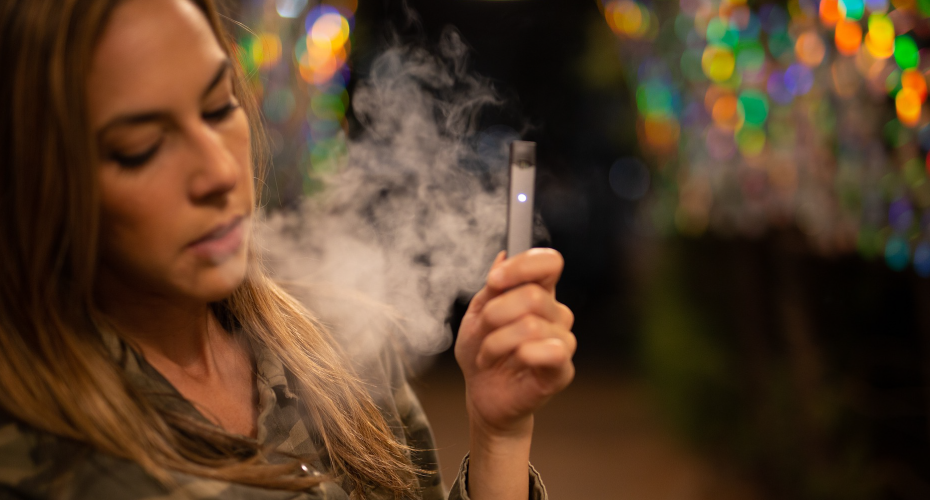Oct 4, 2019
How to talk to your kids about vaping
The number of dangerous and mysterious lung illnesses linked to vaping has skyrocketed to more than 1,000 in 48 states, and more than a third of patients are under age 21, data shows.
Patients, some of whom have lungs that appear to have been exposed to toxic fumes, develop what looks like pneumonia. They struggle to get enough air into their lungs, and many have required intensive care. There have been 19 confirmed deaths, including one in Massachusetts.
Addiction experts note young users are particularly enticed by the fruity and minty flavors of nicotine vapes, which have surged in popularity.
Last month, research showed the number of kids vaping nicotine doubled from 2017 to 2019.
Parents are left wondering how to ensure their own children can remain safe. Here are five doctor-recommended ways to educate children about the dangers of e-cigarettes:
Start early
Although parents may be reluctant to have the vaping discussion while their kids are young, it’s important to educate children before they fall victim to child-focused marketing or peer pressure, said Dr. Laura Arvidson-Guzman, general pediatrician and associate medical director of the Pediatric Complex Care Program at Floating Hospital for Children at Tufts Medical Center.
“It is never to early to have the vaping talk, with the goal of beginning a discussion when a child is still in elementary school and before they may be offered one of these products."
"You want to make sure they understand their parents' message loud and clear, above anything they might see in the media or hear from friends," she said.
Encourage healthy habits
Rather than sitting down to have a pointed discussion about vaping, parents can wrap it into a broader conversation about maintaining a healthy lifestyle, according to Dr. Katherine Dallow, vice president and medical director of clinical programs and strategy for Blue Cross Blue Shield of Massachusetts. “It’s always good to start talking about healthy habits for their body – eating fruits and vegetables, getting proper exercise and sleep,” Dallow said. “Things like smoking cigarettes and vaping and doing drugs all play into that conversation.”

Use social media
Because the exact effects of e-cigarettes are unclear, parents might feel like they’re ill-equipped to answer questions, said Arvidson-Guzman. But there are social media campaigns that can communicate the dangers of vaping to teenagers using a platform they’re familiar with. For example, the U.S. Food and Drug Administration has a Facebook page called “The Real Cost,” which posts important information about vaping. “Multiple chemicals have been identified in vape aerosols, and some of them, like formaldehyde, are known to be harmful,” a recent post says.
Use your own words, not the news
Parents may be tempted to show their children news stories that highlight the dangers of vaping, but that approach may prove to instill excessive fear rather than educate, Dallow said. “The hard thing about the news is it's not written for children,” Dallow said. “You could end up scaring them to the point of paranoia. You don't want them to not be sleeping.” Instead, put it into terms they can process: i.e., “E-cigarettes have chemicals that injure your lungs and other organs.
Make it personal
Rather than talking in generalities, talk about how vaping might affect them specifically, Arvidson-Guzman said. “If a child likes to play sports, ask if he or she has ever thought about the effect cigarettes or vaping might have on performance or the ability to play,” she said. “It may not be something they have considered. Relate it to something that matters to them.” If you find out your child is already vaping – or is tempted to vape – ask them where the urge is coming from, Dallow said. “Ask them, ‘Are you stressed? Are you anxious? Are you doing it because your friends are doing it?’” Dallow said. “Make sure the lines of communication are open and help them find healthier ways to manage any underlying issues.”
The Centers for Disease Control has recommended that people of all ages avoid vaping until the source of the illnesses is found, and some states have taken stronger measures: Michigan, New York, Rhode Island and Washington have temporarily banned flavored e-cigarettes, and Massachusetts last month became the first state to ban all vaping products for four months.
The Massachusetts public health department offers resources geared to teens:
- This is Quitting is a free and confidential texting program for young people who vape. Text “VapeFreeMass” to 88709 to get started.
- My Life, My Quit has youth coach specialists trained to help young people by phone or text. Call or text "Start My Quit" to 855-891-9989 for free and confidential help. For more information or to sign up online, visit mylifemyquit.com.
- Visit teen.smokefree.gov for tools and tips to help you quit.
PHOTO OF Dr. KATHERINE DALLOW BY MICHAEL GRIMMETT

